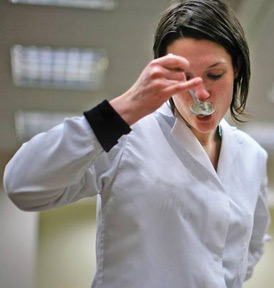Taste has nothing to do with bumpiness of tongue
Thousands of concerned citizens have stuck their tongues out in the
name of science and proved that being a "supertaster" has nothing to do
with the number of bumps on your taste buds.
Supertasters are the minority the population who have a heightened
sense of taste - particularly for bitter compounds - and for many years
scientists have linked the trait with the number of "fungiform papillae"
or sensory bumps on the tongue.
However, with the help of 3,000 "citizen scientists", researchers
have now proved that there is in fact no link between the number
papillae on someone's tongue and whether or not they can taste certain
kinds of bitter compounds.
|

A tea buyer tasting the goods |
"There is a long-held belief that if you stick out your tongue and
look at the bumps on it, then you can predict how sensitive you are to
strong tastes like bitterness in vegetables and strong sensations like
spiciness," said Nicole Garneau of the Denver Museum of Nature and
Science in Colorado.
"The commonly accepted theory has been that the more bumps you have,
the more taste buds you have and therefore the more sensitive you
are...[but] no matter how we looked at the data, we couldn't replicate
this long held assumption that a high number of papillae equals
supertasting," Dr Garneau said.
Supertasters are defined by whether they can detect the presence of
two bitter-tasting compounds, phenylthiocarbamide (PTC) and
propylthiouracil (PROP), and geneticists have shown that this ability
depends to a large extent on certain variations of a gene known as
TAS2R38.
However, scientists believed that the density of taste buds on the
tongue also played a part - a belief that goes back more than 20 years -
and that taste bud density and supertasting could also explain food
pickiness in some children who were more sensitive to bitter-tasting
substances in spicy foods and in vegetables such as Brussels sprouts. Dr
Garneau and her colleagues tested the theory with the help of 3,000
visitors to the Denver museum's Genetics of Taste Lab. The number of
sensory papillae were counted on each tongue and each volunteer was
assessed for their sensitivity to PROP.
Nearly 400 of the volunteers also had their genetic make-up analysed
to see which kind of TAS2R38 gene they had inherited.
The results of the study, showed that the density of sensory papillae
on a person's tongue could not "in any way" be used to predict whether
or not they could taste PROP. The researchers found that this was true
irrespective of gender, age or a person's genetic make-up with respect
to the gene TASR38. However, the study confirmed that TAS2R38 on its own
did play a significant role in determining someone's tasting ability,
although it could not completely explain all the differences seen
between different people. Dr Garneau said that the findings question the
scientific definition of supertasting and suggested the term itself
should be replaced by one that indicates a spectrum of tasting abilities
between people rather than whether someone falls into one camp or
another.
"What we know and understand about how our bodies work improves
greatly when we challenge central dogmas of our knowledge. This is the
nature of science itself," Dr Garneau said.
"As techniques improve, so too does our ability to do science, and we
find that what we accepted as truth 20, 30, or 100 years ago gets
replaced with better theories as we gather new data, which advances
science," she said.
"In this case, we've proven that with the 'Denver Papillae Protocol',
our new method for objective analysis for papillae density, we were
unable to replicate well-known studies about supertasting," she added.
What is a supertaster?
People vary greatly in their sense of taste which can be explained by
both cultural upbringing and experience, as well as genetics. Scientists
have defined "supertasters" as those people who are revolted by the
taste of the bitter compounds propylthiouracil (PROP) and
phenylthiocarbamide (PTC).
About 25 percent of people are considered to be supertasters,
although the proportion can vary between the sexes and between ethnic
groups. It also seems that children are more sensitive to the sense of
bitterness than adults, which may explain why many of them find Brussels
sprouts revolting.
Although scientists showed in the 1960s that supertasting had a
genetic tongue anatomy may also play a role in the form of the number of
sensory papillae on the taste buds.
This has led to the widely-held view that the number of bumps on the
tongue can indicate how good you are at discerning quality of a
particular wine or the culinary ability of a certain chef. However, the
latest research appears to have disproved this theory and has even
called into question the entire notion of "supertasters".
- The Independent |

